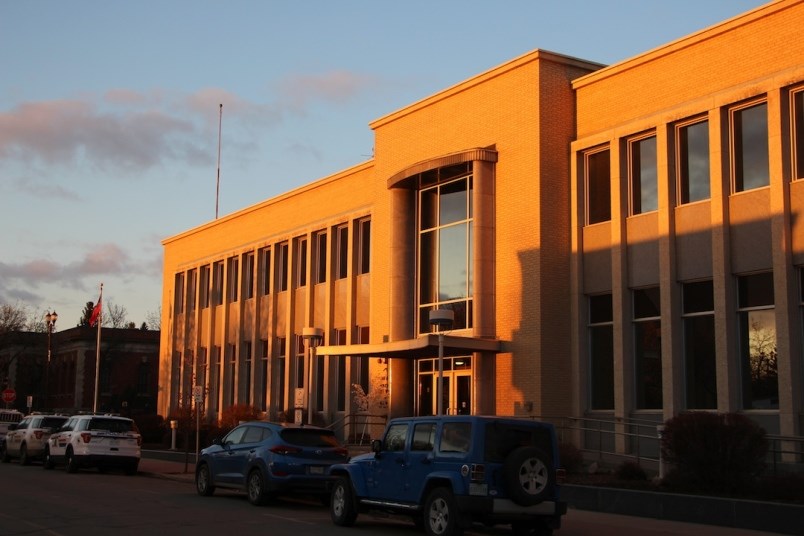PR Investments Inc. owns a trio of apartment buildings in Yorkton, and they think their City property taxes are too high.
Monday Wade Probe Chief Financial Officer, C-owner PR Investments Inc. made a presentation to the regular meeting of Yorkton Council asking for some relieve, or at the very least a review of tax policy.
“We find ourselves at a cross roads with a disparaging tax structure that negatively affects our competitiveness in the City of Yorkton,” detailed a letter presented to Council as part of Probe’s presentation. “The current structure of the Yorkton Base Tax rate appears fundamentally different from the base rates of the other communities that we have the pleasure of С����Ƶ active entrepreneurs in.
“To put it simply, we pay the equivalent of one month’s rent in property tax for each unit in a multi-unit facility in the Cities of Regina and Moose Jaw. In Yorkton, the comparison is almost double that rate, the equivalent of nearly two months’ rent for each unit in a similar multi-unit facility. This inequity has a huge impact on our decisions corporately to continue and maintain a business presence in a community and whether or not to grow our asset base.”
The situation needs addressed said Probe.
While we presented to a closed session of Council last year, and had some very favourable feedback and compliments paid to our company and its management, we still find ourselves with a significant tax disparity between same or similar size communities in the southern part of our province, he noted.
“If we were to make a broad provincial comparison, our buildings in Yorkton would expect to have a tax requirement of approximately $30,600 per building annually. However, we find ourselves С����Ƶ assessed at $47,772 for two buildings and $43,752 for a third. Collectively the difference between what we feel is fair and what we are С����Ƶ assessed annually is $47, 496,” stated the letter.
“Our presentation with you will hopefully achieve an understanding of this inequity, and request that it be reviewed by Administration and be reported back to Council,” detailed the letter.
Ashley Stradeski, Director of Finance, with the City said as part of our tax structure, the City of Yorkton implements a base tax on all residential properties. This base tax is $795 per residential unit, plus an additional $100 Gallagher Centre levy on the same.
“With regards to high-density multi-unit properties, the base tax (and the entire tax rate) is levied at 90 percent to recognize the benefits of high-density housing and give a discount,” he added.
“The philosophy behind this base tax is that all residents use some level of City services, and thus establishes a baseline that all residences pay before having “regular” property tax levied based on the assessed value of the residence. As we collect this base tax, we then are able to levy lower mill rates for taxation based on the assessed value of a property than we would otherwise have to. This results in a more even distribution of taxes among residences, as the base tax ensures that base services are paid for by everyone – a resident does not necessarily use less streets, parks or protective services simply because their property is worth less, and this way everyone pays their share,” detailed a report from Stradeski to Council.
“Our base tax amount is not arbitrary – it is a calculated number. It is the combined Protective Services budget – Police and Fire Services – totaled up, and applied out among the residential units within the City at a percentage, which was the residential / commercial split at the time.”
Stradeski noted, with regards to the letter presented from PR Investments, the biggest issue seems to be with the base tax levy – indeed, over 70 percent of their tax on a building comes from the base tax. However, without our base tax in place our mill rates would be significantly higher than they currently are, so it’s difficult to predict what the taxes on this building would be without a base tax.
It is also difficult to compare taxes city-to-city, said Stradeski.
The first request made in the letter was regarding tax relief for commercial businesses. This is something that Council has discretion on, under The Cities Act, council may “cancel or refund all or any part of a tax”, noted Stradeski’s presentation.
“The second request in the letter was asking for a review of our taxation structure. This is surely something that Council could request, though as 2020’s tax policy is already cemented into a bylaw and levied, it would be done in conjunction with the 2021 tax policy. This specific item was brought up in discussion during our tax policy strategic planning session earlier this year with Council, with no decision to make changes,” it continued.
Stradeski said the review is logical.
Given the above two requests, Administration is fully behind reviewing our underlying tax structure with the upcoming 2021 tax policy review, including the changes from the assessment revaluation for 2021, he said.
“For the request for relief, this is tougher to get behind as we still do not know the full impact of the pandemic on our finances which makes it difficult to offer relief funds when we ourselves may be facing a shortfall – these would have to be made up by the remainder of the taxpayers in the future,” he added.
Council would deny the request for relief from PR Investments, and direct Administration to include high-density multi-unit base tax changes in the upcoming 2021 tax policy discussions.




